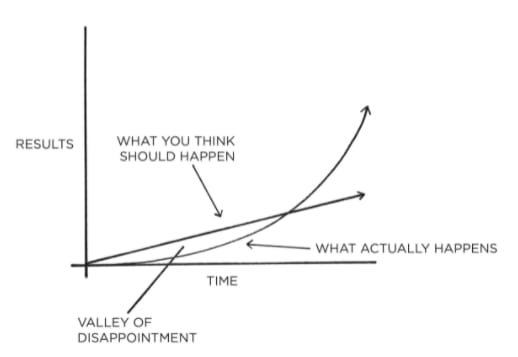Hi folks! I'll be covering the fundamentals of habits and some ideas, important lessons and quotes from the book Atomic Habits by James Clear, so please if you find this interesting I highly recommend reading the book.
Why habits matter?
It is so easy to overestimate the importance of one defining moment and underestimate the value of making small improvements on a daily basis. Too often, we convince ourselves that massive success requires massive action.
Like everything that's good, it takes time to see the results. Habits are the compound interest of self-improvement. The same way that money multiplies through compound interest, the effects of your habits multiply as you repeat them.
Habits are important because they free us of thinking every step of an action. They give us space to think in a higher level, habits let us ignore the tiny details that are automated on each repetition. When we start driving we are very conscious about every action we take to prevent crashing the car. As we gain experience and drive more often, we stop thinking about "putting the right shift" or "turning on the turn signal" and we start thinking about interactions with other cars and the subtle actions of people walking.
Systems and goals
Goals are about the results you want to achieve. Systems are about the processes that lead to those results. Goals are good for setting a direction, but systems are best for making progress. A handful of problems arise when you spend too much time thinking about your goals and not enough time designing your systems.
Winners and losers have the same goals: We concentrate on the people who end up winning and mistakenly assume that ambitious goals led to their success, while overlooking all the people who had the same objective but didn’t succeed.
Achieving a goal is only a momentary change: Usually when chasing a goal, we treat the symptom without addressing the cause. For example, if you summon the energy to organize your room, you will have a clean room... for now. But if you keep your usual disorganized habits, it won't be long until your room is all cluttered again.
Goals restrict your happiness: The implicit assumption behind any goal is this: “Once I reach my goal, then I’ll be happy.” The problem with a goals-first mentality is that you’re continually putting happiness off until the next milestone. Furthermore, goals create an “either-or” conflict: either you achieve your goal and are successful or you fail and you are a disappointment. This is totally misguided as there are many ways to success and life is unpredictable.
Goals are the enemy of long-term progress: A goal-oriented mind may limit your motivation. Many runners work hard for months, but as soon as they cross the finish line, they stop training. The race is no longer there to motivate them. When all of your hard work is focused on a particular goal, what is left to push you forward after you achieve it? This is why many people find themselves reverting to their old habits after accomplishing a goal.
Habits < -- shape -- > Identity
It's bidirectional, habits shape your identity and your identity shapes your habits. As was said earlier, we need to change the system that drives us every day to change the outcomes we get. The beliefs and assumptions about ourselves shape our system and interactions.
If you don't start to think about yourself as a runner, you won't be running daily. Behavior that is incongruent with the self will not last. You may want more money, but if you identify as someone who consumes rather than creates, then you’ll continue to be pulled toward spending rather than earning. It’s hard to change your habits if you never change the underlying beliefs that led to your past behavior. You have a new goal and a new plan, but you haven’t changed who you are.
Ultimately, your habits matter because they help you become the type of person you wish to be. They are the channel through which you develop your deepest beliefs about yourself. Quite literally, you become your habits.








Top comments (0)